The Role of Leaders and Managers in Employee Development at Tesco
VerifiedAdded on 2023/06/12
|30
|8305
|291
Report
AI Summary
This report investigates the significant roles of line managers and leaders in employee development within Tesco, a British multinational groceries retailer. It aims to identify and understand how these roles contribute to talent development, improve employee skills, and address challenges faced by the organization. The research questions focus on the specific functions of line managers and leaders in fostering employee growth and the obstacles Tesco has overcome in this area. The methodology involves a literature review and data analysis to explore these aspects, highlighting the importance of employee development for enhancing productivity, brand image, and overall organizational success. The study also touches upon the strategies required to deal with such challenges, and also the benefits of employee satisfaction and retention, increase performance and productivity and enhance profitability levels.

Research Project
Paraphrase This Document
Need a fresh take? Get an instant paraphrase of this document with our AI Paraphraser
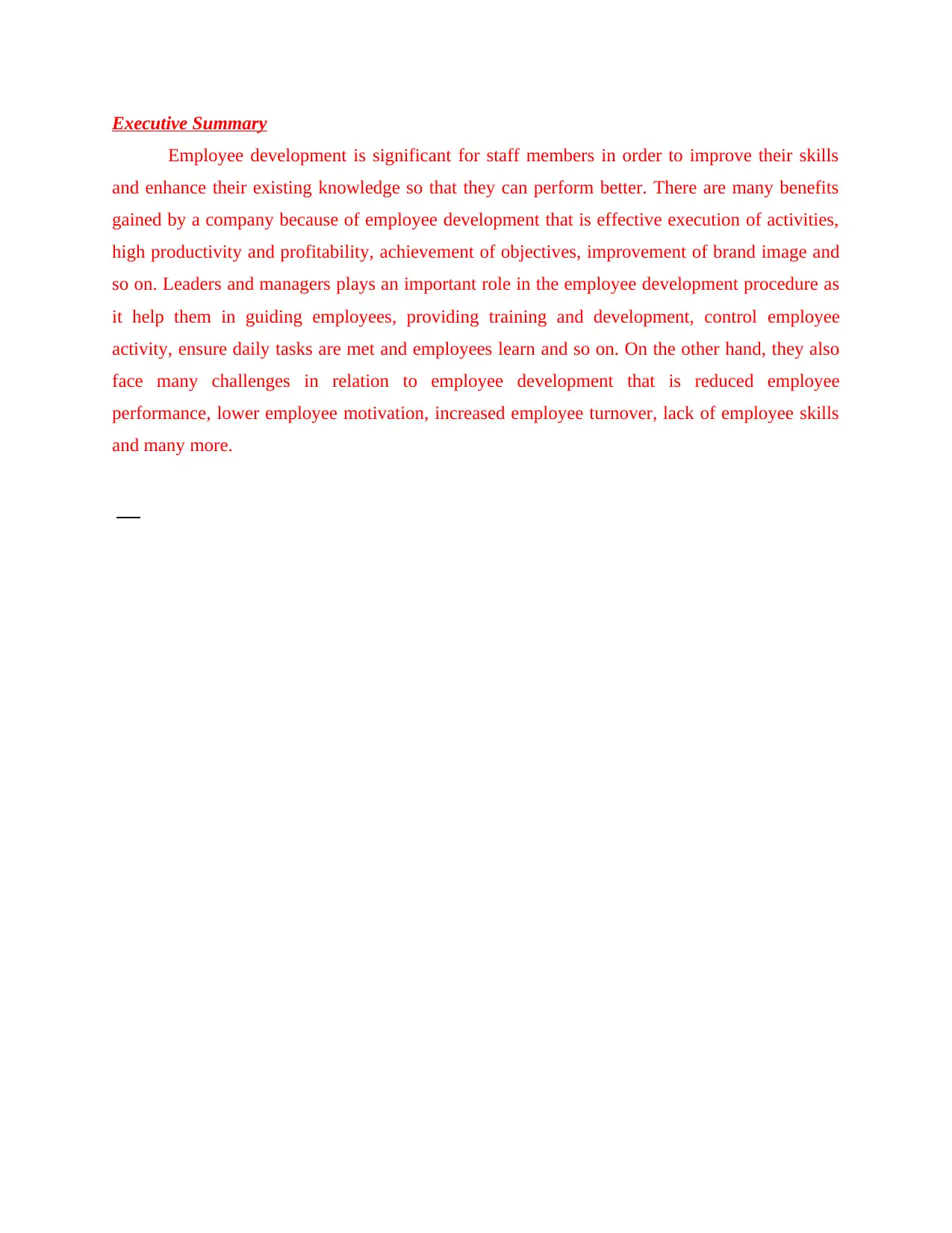
Executive Summary
Employee development is significant for staff members in order to improve their skills
and enhance their existing knowledge so that they can perform better. There are many benefits
gained by a company because of employee development that is effective execution of activities,
high productivity and profitability, achievement of objectives, improvement of brand image and
so on. Leaders and managers plays an important role in the employee development procedure as
it help them in guiding employees, providing training and development, control employee
activity, ensure daily tasks are met and employees learn and so on. On the other hand, they also
face many challenges in relation to employee development that is reduced employee
performance, lower employee motivation, increased employee turnover, lack of employee skills
and many more.
Employee development is significant for staff members in order to improve their skills
and enhance their existing knowledge so that they can perform better. There are many benefits
gained by a company because of employee development that is effective execution of activities,
high productivity and profitability, achievement of objectives, improvement of brand image and
so on. Leaders and managers plays an important role in the employee development procedure as
it help them in guiding employees, providing training and development, control employee
activity, ensure daily tasks are met and employees learn and so on. On the other hand, they also
face many challenges in relation to employee development that is reduced employee
performance, lower employee motivation, increased employee turnover, lack of employee skills
and many more.
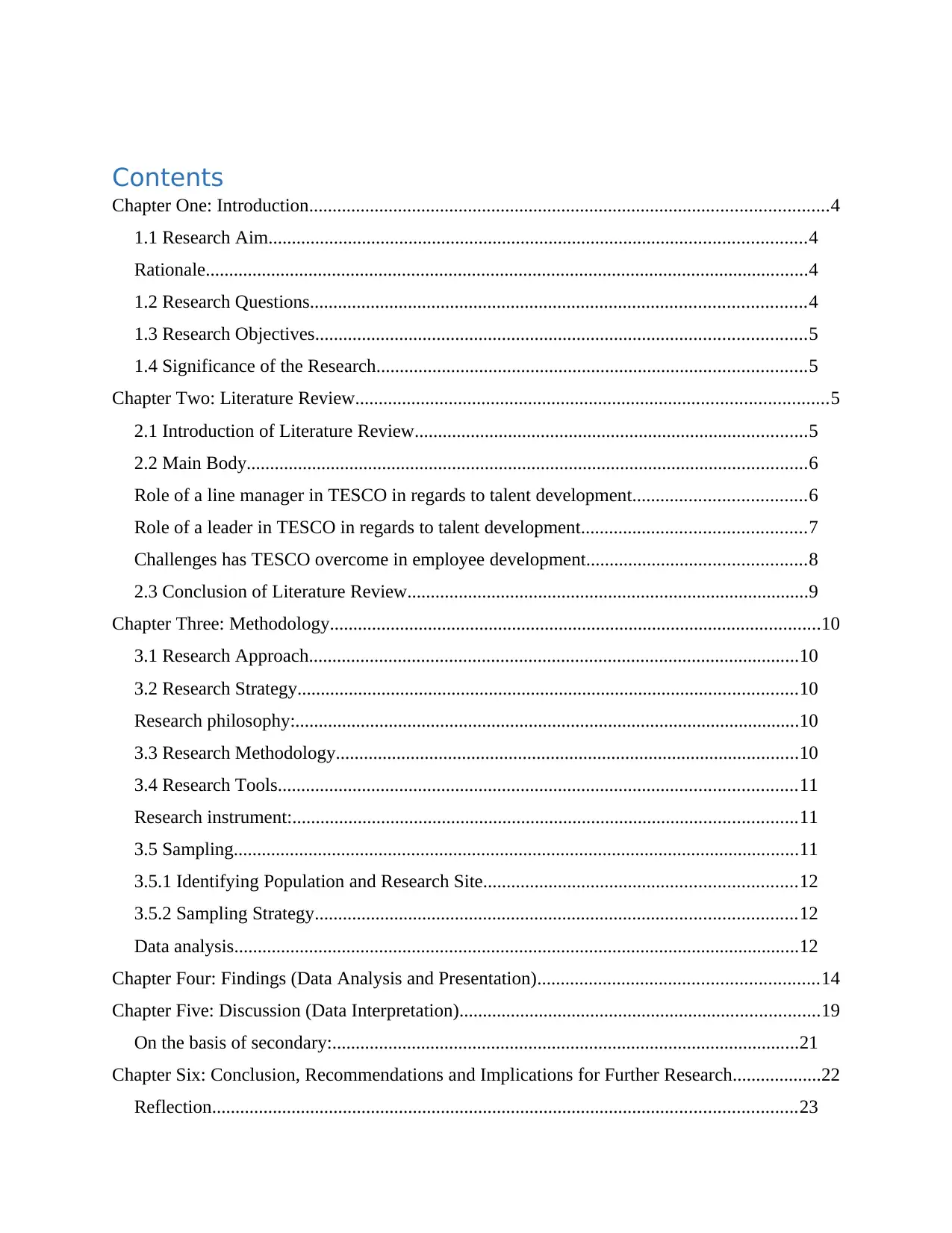
Contents
Chapter One: Introduction...............................................................................................................4
1.1 Research Aim...................................................................................................................4
Rationale.................................................................................................................................4
1.2 Research Questions..........................................................................................................4
1.3 Research Objectives.........................................................................................................5
1.4 Significance of the Research............................................................................................5
Chapter Two: Literature Review.....................................................................................................5
2.1 Introduction of Literature Review....................................................................................5
2.2 Main Body........................................................................................................................6
Role of a line manager in TESCO in regards to talent development.....................................6
Role of a leader in TESCO in regards to talent development................................................7
Challenges has TESCO overcome in employee development...............................................8
2.3 Conclusion of Literature Review......................................................................................9
Chapter Three: Methodology.........................................................................................................10
3.1 Research Approach.........................................................................................................10
3.2 Research Strategy...........................................................................................................10
Research philosophy:............................................................................................................10
3.3 Research Methodology...................................................................................................10
3.4 Research Tools...............................................................................................................11
Research instrument:............................................................................................................11
3.5 Sampling.........................................................................................................................11
3.5.1 Identifying Population and Research Site...................................................................12
3.5.2 Sampling Strategy.......................................................................................................12
Data analysis.........................................................................................................................12
Chapter Four: Findings (Data Analysis and Presentation)............................................................14
Chapter Five: Discussion (Data Interpretation).............................................................................19
On the basis of secondary:....................................................................................................21
Chapter Six: Conclusion, Recommendations and Implications for Further Research...................22
Reflection.............................................................................................................................23
Chapter One: Introduction...............................................................................................................4
1.1 Research Aim...................................................................................................................4
Rationale.................................................................................................................................4
1.2 Research Questions..........................................................................................................4
1.3 Research Objectives.........................................................................................................5
1.4 Significance of the Research............................................................................................5
Chapter Two: Literature Review.....................................................................................................5
2.1 Introduction of Literature Review....................................................................................5
2.2 Main Body........................................................................................................................6
Role of a line manager in TESCO in regards to talent development.....................................6
Role of a leader in TESCO in regards to talent development................................................7
Challenges has TESCO overcome in employee development...............................................8
2.3 Conclusion of Literature Review......................................................................................9
Chapter Three: Methodology.........................................................................................................10
3.1 Research Approach.........................................................................................................10
3.2 Research Strategy...........................................................................................................10
Research philosophy:............................................................................................................10
3.3 Research Methodology...................................................................................................10
3.4 Research Tools...............................................................................................................11
Research instrument:............................................................................................................11
3.5 Sampling.........................................................................................................................11
3.5.1 Identifying Population and Research Site...................................................................12
3.5.2 Sampling Strategy.......................................................................................................12
Data analysis.........................................................................................................................12
Chapter Four: Findings (Data Analysis and Presentation)............................................................14
Chapter Five: Discussion (Data Interpretation).............................................................................19
On the basis of secondary:....................................................................................................21
Chapter Six: Conclusion, Recommendations and Implications for Further Research...................22
Reflection.............................................................................................................................23
⊘ This is a preview!⊘
Do you want full access?
Subscribe today to unlock all pages.

Trusted by 1+ million students worldwide
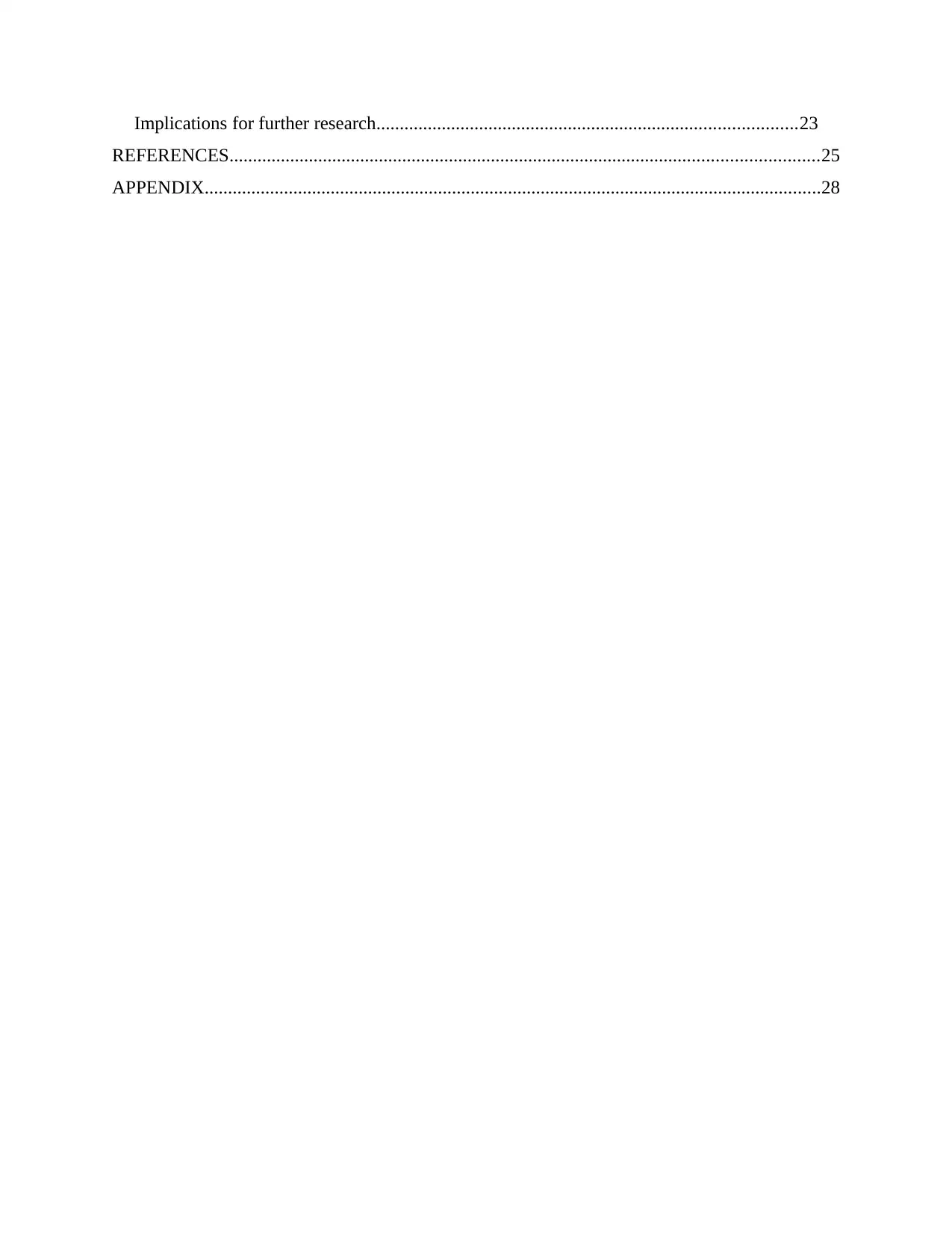
Implications for further research..........................................................................................23
REFERENCES..............................................................................................................................25
APPENDIX....................................................................................................................................28
REFERENCES..............................................................................................................................25
APPENDIX....................................................................................................................................28
Paraphrase This Document
Need a fresh take? Get an instant paraphrase of this document with our AI Paraphraser
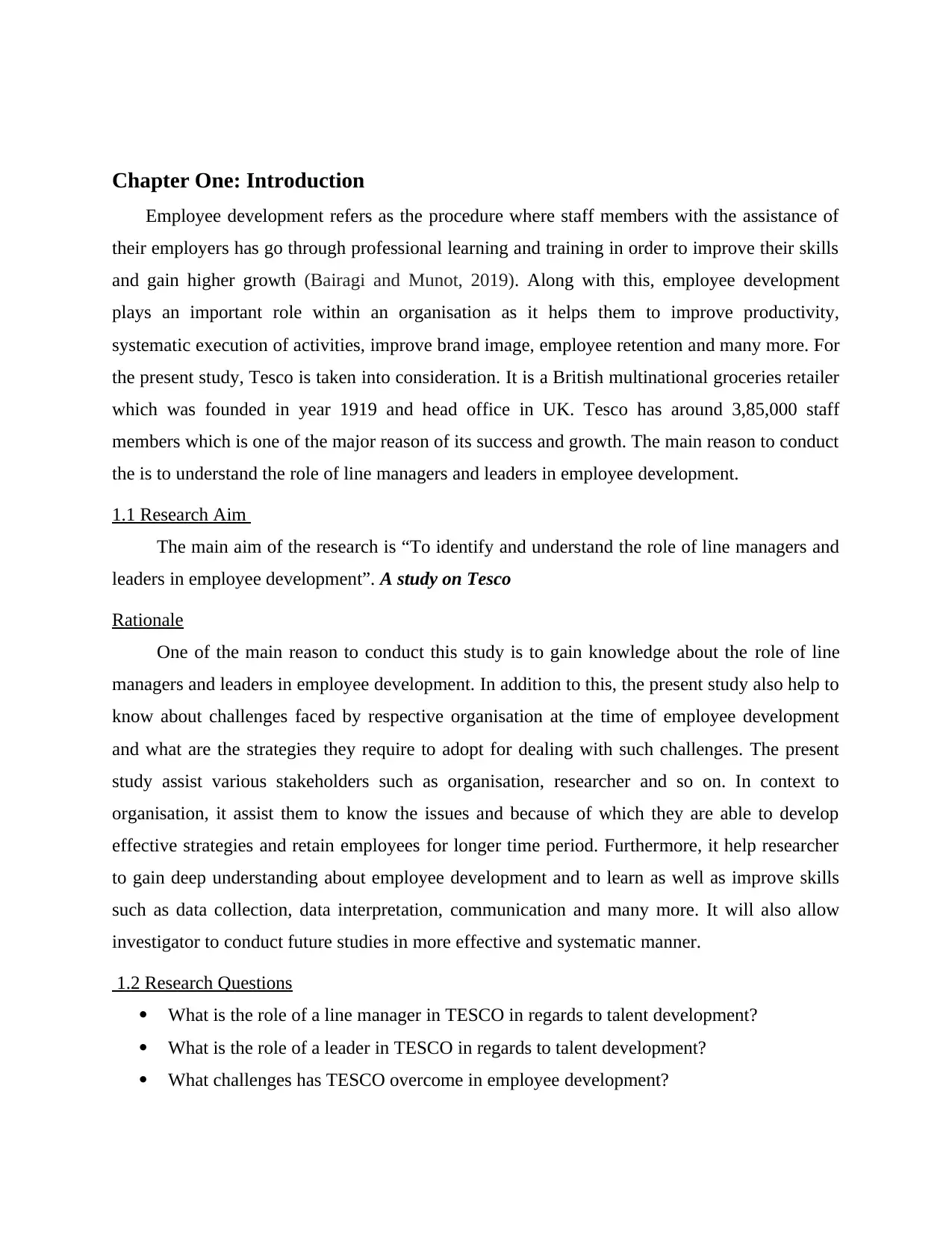
Chapter One: Introduction
Employee development refers as the procedure where staff members with the assistance of
their employers has go through professional learning and training in order to improve their skills
and gain higher growth (Bairagi and Munot, 2019). Along with this, employee development
plays an important role within an organisation as it helps them to improve productivity,
systematic execution of activities, improve brand image, employee retention and many more. For
the present study, Tesco is taken into consideration. It is a British multinational groceries retailer
which was founded in year 1919 and head office in UK. Tesco has around 3,85,000 staff
members which is one of the major reason of its success and growth. The main reason to conduct
the is to understand the role of line managers and leaders in employee development.
1.1 Research Aim
The main aim of the research is “To identify and understand the role of line managers and
leaders in employee development”. A study on Tesco
Rationale
One of the main reason to conduct this study is to gain knowledge about the role of line
managers and leaders in employee development. In addition to this, the present study also help to
know about challenges faced by respective organisation at the time of employee development
and what are the strategies they require to adopt for dealing with such challenges. The present
study assist various stakeholders such as organisation, researcher and so on. In context to
organisation, it assist them to know the issues and because of which they are able to develop
effective strategies and retain employees for longer time period. Furthermore, it help researcher
to gain deep understanding about employee development and to learn as well as improve skills
such as data collection, data interpretation, communication and many more. It will also allow
investigator to conduct future studies in more effective and systematic manner.
1.2 Research Questions
What is the role of a line manager in TESCO in regards to talent development?
What is the role of a leader in TESCO in regards to talent development?
What challenges has TESCO overcome in employee development?
Employee development refers as the procedure where staff members with the assistance of
their employers has go through professional learning and training in order to improve their skills
and gain higher growth (Bairagi and Munot, 2019). Along with this, employee development
plays an important role within an organisation as it helps them to improve productivity,
systematic execution of activities, improve brand image, employee retention and many more. For
the present study, Tesco is taken into consideration. It is a British multinational groceries retailer
which was founded in year 1919 and head office in UK. Tesco has around 3,85,000 staff
members which is one of the major reason of its success and growth. The main reason to conduct
the is to understand the role of line managers and leaders in employee development.
1.1 Research Aim
The main aim of the research is “To identify and understand the role of line managers and
leaders in employee development”. A study on Tesco
Rationale
One of the main reason to conduct this study is to gain knowledge about the role of line
managers and leaders in employee development. In addition to this, the present study also help to
know about challenges faced by respective organisation at the time of employee development
and what are the strategies they require to adopt for dealing with such challenges. The present
study assist various stakeholders such as organisation, researcher and so on. In context to
organisation, it assist them to know the issues and because of which they are able to develop
effective strategies and retain employees for longer time period. Furthermore, it help researcher
to gain deep understanding about employee development and to learn as well as improve skills
such as data collection, data interpretation, communication and many more. It will also allow
investigator to conduct future studies in more effective and systematic manner.
1.2 Research Questions
What is the role of a line manager in TESCO in regards to talent development?
What is the role of a leader in TESCO in regards to talent development?
What challenges has TESCO overcome in employee development?
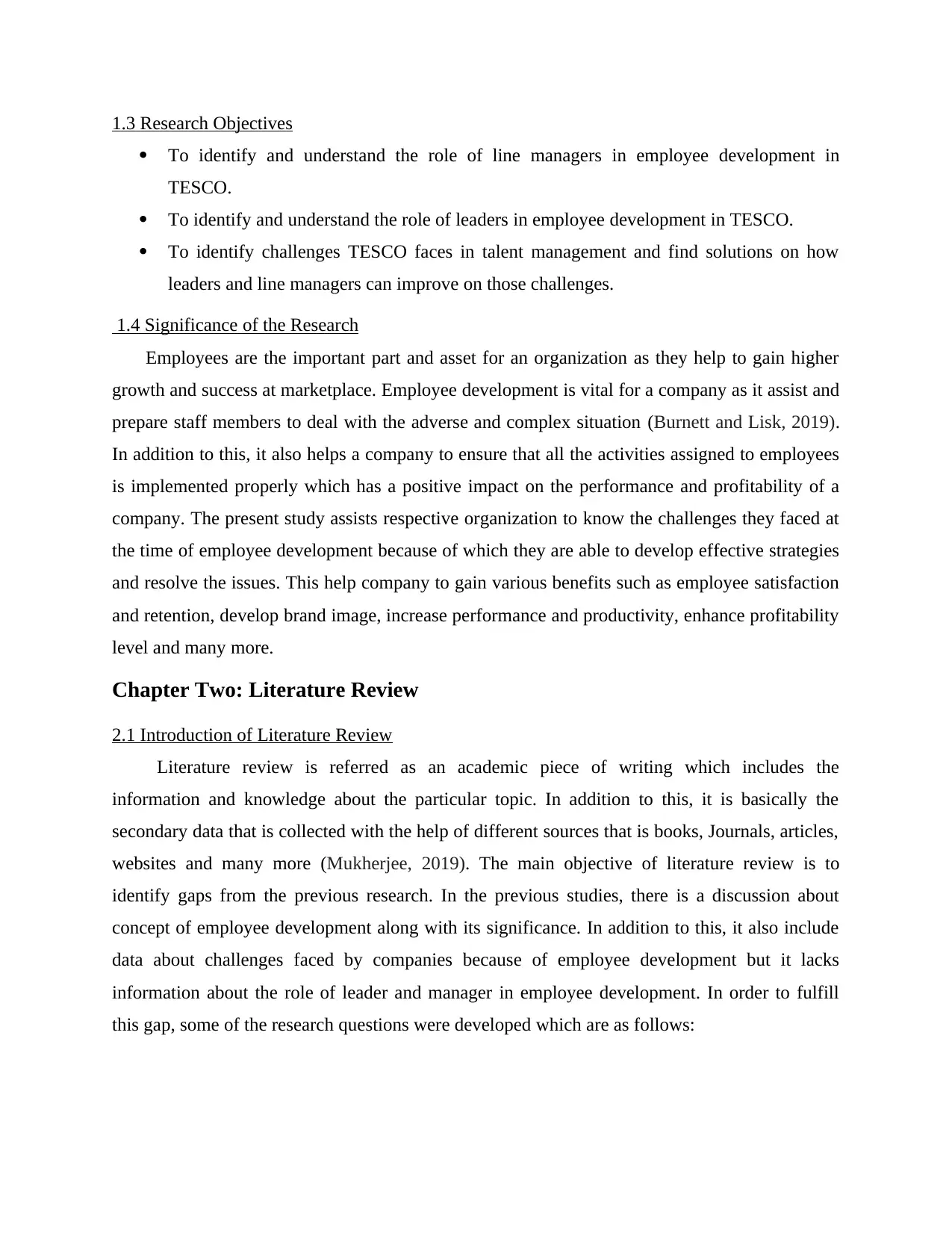
1.3 Research Objectives
To identify and understand the role of line managers in employee development in
TESCO.
To identify and understand the role of leaders in employee development in TESCO.
To identify challenges TESCO faces in talent management and find solutions on how
leaders and line managers can improve on those challenges.
1.4 Significance of the Research
Employees are the important part and asset for an organization as they help to gain higher
growth and success at marketplace. Employee development is vital for a company as it assist and
prepare staff members to deal with the adverse and complex situation (Burnett and Lisk, 2019).
In addition to this, it also helps a company to ensure that all the activities assigned to employees
is implemented properly which has a positive impact on the performance and profitability of a
company. The present study assists respective organization to know the challenges they faced at
the time of employee development because of which they are able to develop effective strategies
and resolve the issues. This help company to gain various benefits such as employee satisfaction
and retention, develop brand image, increase performance and productivity, enhance profitability
level and many more.
Chapter Two: Literature Review
2.1 Introduction of Literature Review
Literature review is referred as an academic piece of writing which includes the
information and knowledge about the particular topic. In addition to this, it is basically the
secondary data that is collected with the help of different sources that is books, Journals, articles,
websites and many more (Mukherjee, 2019). The main objective of literature review is to
identify gaps from the previous research. In the previous studies, there is a discussion about
concept of employee development along with its significance. In addition to this, it also include
data about challenges faced by companies because of employee development but it lacks
information about the role of leader and manager in employee development. In order to fulfill
this gap, some of the research questions were developed which are as follows:
To identify and understand the role of line managers in employee development in
TESCO.
To identify and understand the role of leaders in employee development in TESCO.
To identify challenges TESCO faces in talent management and find solutions on how
leaders and line managers can improve on those challenges.
1.4 Significance of the Research
Employees are the important part and asset for an organization as they help to gain higher
growth and success at marketplace. Employee development is vital for a company as it assist and
prepare staff members to deal with the adverse and complex situation (Burnett and Lisk, 2019).
In addition to this, it also helps a company to ensure that all the activities assigned to employees
is implemented properly which has a positive impact on the performance and profitability of a
company. The present study assists respective organization to know the challenges they faced at
the time of employee development because of which they are able to develop effective strategies
and resolve the issues. This help company to gain various benefits such as employee satisfaction
and retention, develop brand image, increase performance and productivity, enhance profitability
level and many more.
Chapter Two: Literature Review
2.1 Introduction of Literature Review
Literature review is referred as an academic piece of writing which includes the
information and knowledge about the particular topic. In addition to this, it is basically the
secondary data that is collected with the help of different sources that is books, Journals, articles,
websites and many more (Mukherjee, 2019). The main objective of literature review is to
identify gaps from the previous research. In the previous studies, there is a discussion about
concept of employee development along with its significance. In addition to this, it also include
data about challenges faced by companies because of employee development but it lacks
information about the role of leader and manager in employee development. In order to fulfill
this gap, some of the research questions were developed which are as follows:
⊘ This is a preview!⊘
Do you want full access?
Subscribe today to unlock all pages.

Trusted by 1+ million students worldwide
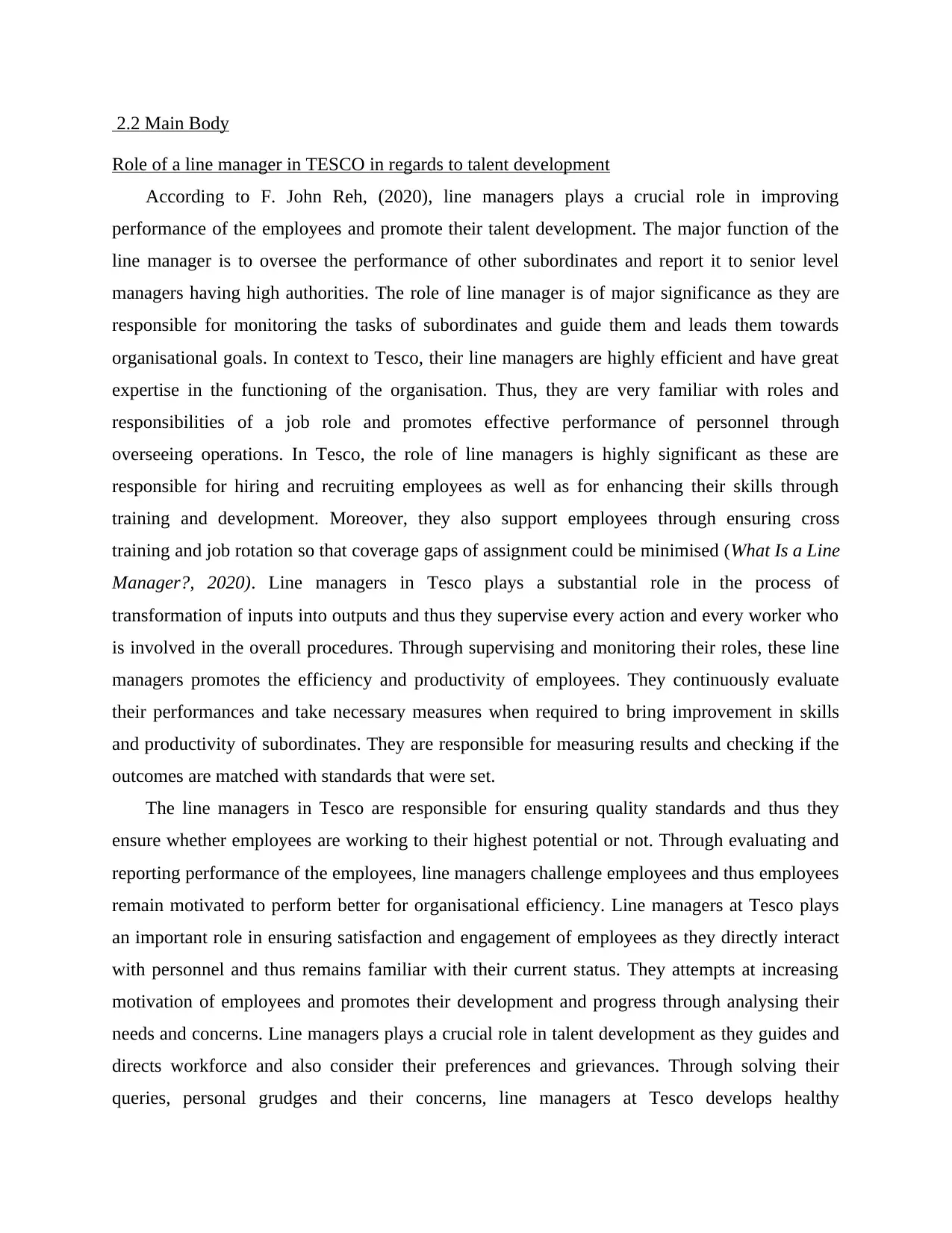
2.2 Main Body
Role of a line manager in TESCO in regards to talent development
According to F. John Reh, (2020), line managers plays a crucial role in improving
performance of the employees and promote their talent development. The major function of the
line manager is to oversee the performance of other subordinates and report it to senior level
managers having high authorities. The role of line manager is of major significance as they are
responsible for monitoring the tasks of subordinates and guide them and leads them towards
organisational goals. In context to Tesco, their line managers are highly efficient and have great
expertise in the functioning of the organisation. Thus, they are very familiar with roles and
responsibilities of a job role and promotes effective performance of personnel through
overseeing operations. In Tesco, the role of line managers is highly significant as these are
responsible for hiring and recruiting employees as well as for enhancing their skills through
training and development. Moreover, they also support employees through ensuring cross
training and job rotation so that coverage gaps of assignment could be minimised (What Is a Line
Manager?, 2020). Line managers in Tesco plays a substantial role in the process of
transformation of inputs into outputs and thus they supervise every action and every worker who
is involved in the overall procedures. Through supervising and monitoring their roles, these line
managers promotes the efficiency and productivity of employees. They continuously evaluate
their performances and take necessary measures when required to bring improvement in skills
and productivity of subordinates. They are responsible for measuring results and checking if the
outcomes are matched with standards that were set.
The line managers in Tesco are responsible for ensuring quality standards and thus they
ensure whether employees are working to their highest potential or not. Through evaluating and
reporting performance of the employees, line managers challenge employees and thus employees
remain motivated to perform better for organisational efficiency. Line managers at Tesco plays
an important role in ensuring satisfaction and engagement of employees as they directly interact
with personnel and thus remains familiar with their current status. They attempts at increasing
motivation of employees and promotes their development and progress through analysing their
needs and concerns. Line managers plays a crucial role in talent development as they guides and
directs workforce and also consider their preferences and grievances. Through solving their
queries, personal grudges and their concerns, line managers at Tesco develops healthy
Role of a line manager in TESCO in regards to talent development
According to F. John Reh, (2020), line managers plays a crucial role in improving
performance of the employees and promote their talent development. The major function of the
line manager is to oversee the performance of other subordinates and report it to senior level
managers having high authorities. The role of line manager is of major significance as they are
responsible for monitoring the tasks of subordinates and guide them and leads them towards
organisational goals. In context to Tesco, their line managers are highly efficient and have great
expertise in the functioning of the organisation. Thus, they are very familiar with roles and
responsibilities of a job role and promotes effective performance of personnel through
overseeing operations. In Tesco, the role of line managers is highly significant as these are
responsible for hiring and recruiting employees as well as for enhancing their skills through
training and development. Moreover, they also support employees through ensuring cross
training and job rotation so that coverage gaps of assignment could be minimised (What Is a Line
Manager?, 2020). Line managers in Tesco plays a substantial role in the process of
transformation of inputs into outputs and thus they supervise every action and every worker who
is involved in the overall procedures. Through supervising and monitoring their roles, these line
managers promotes the efficiency and productivity of employees. They continuously evaluate
their performances and take necessary measures when required to bring improvement in skills
and productivity of subordinates. They are responsible for measuring results and checking if the
outcomes are matched with standards that were set.
The line managers in Tesco are responsible for ensuring quality standards and thus they
ensure whether employees are working to their highest potential or not. Through evaluating and
reporting performance of the employees, line managers challenge employees and thus employees
remain motivated to perform better for organisational efficiency. Line managers at Tesco plays
an important role in ensuring satisfaction and engagement of employees as they directly interact
with personnel and thus remains familiar with their current status. They attempts at increasing
motivation of employees and promotes their development and progress through analysing their
needs and concerns. Line managers plays a crucial role in talent development as they guides and
directs workforce and also consider their preferences and grievances. Through solving their
queries, personal grudges and their concerns, line managers at Tesco develops healthy
Paraphrase This Document
Need a fresh take? Get an instant paraphrase of this document with our AI Paraphraser
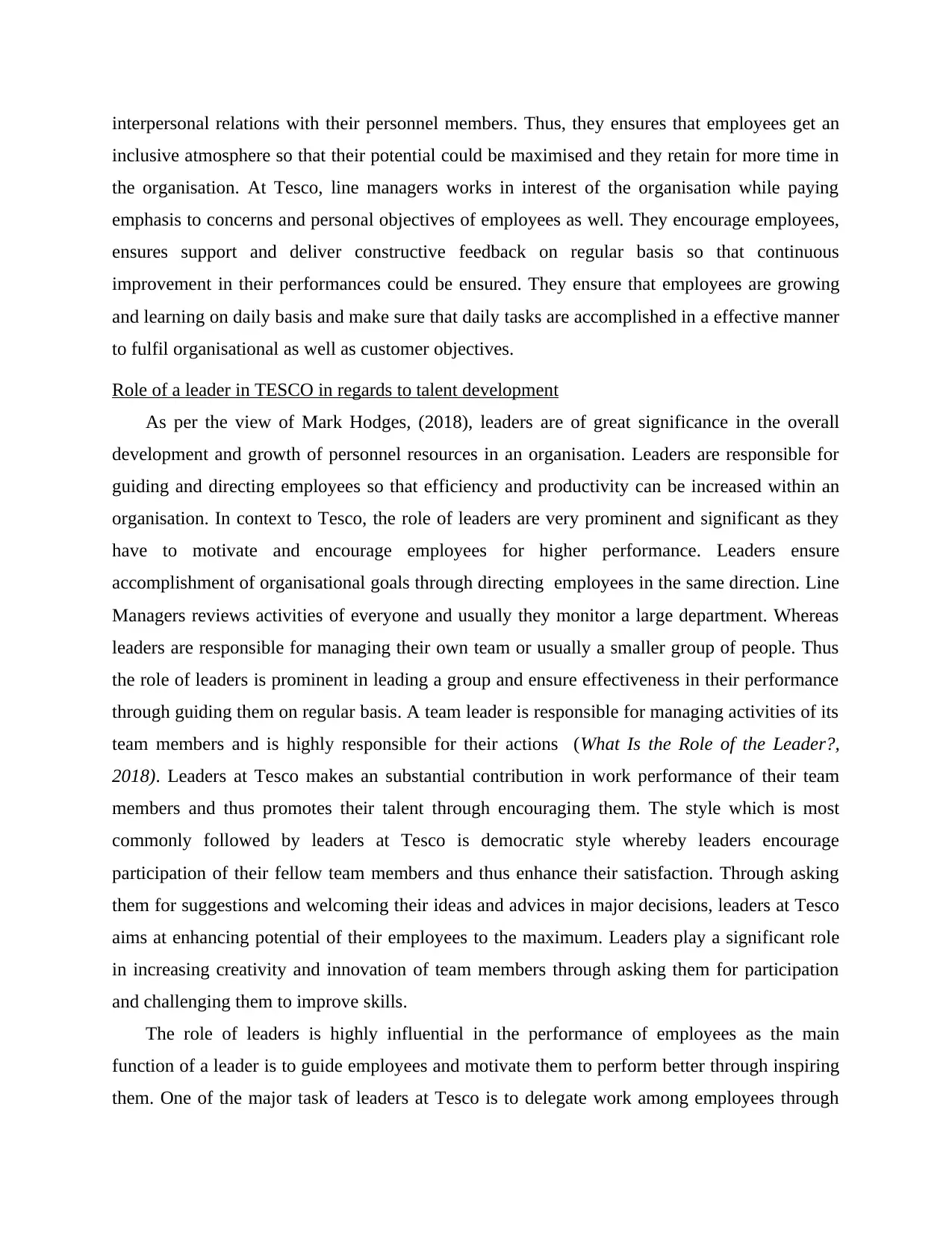
interpersonal relations with their personnel members. Thus, they ensures that employees get an
inclusive atmosphere so that their potential could be maximised and they retain for more time in
the organisation. At Tesco, line managers works in interest of the organisation while paying
emphasis to concerns and personal objectives of employees as well. They encourage employees,
ensures support and deliver constructive feedback on regular basis so that continuous
improvement in their performances could be ensured. They ensure that employees are growing
and learning on daily basis and make sure that daily tasks are accomplished in a effective manner
to fulfil organisational as well as customer objectives.
Role of a leader in TESCO in regards to talent development
As per the view of Mark Hodges, (2018), leaders are of great significance in the overall
development and growth of personnel resources in an organisation. Leaders are responsible for
guiding and directing employees so that efficiency and productivity can be increased within an
organisation. In context to Tesco, the role of leaders are very prominent and significant as they
have to motivate and encourage employees for higher performance. Leaders ensure
accomplishment of organisational goals through directing employees in the same direction. Line
Managers reviews activities of everyone and usually they monitor a large department. Whereas
leaders are responsible for managing their own team or usually a smaller group of people. Thus
the role of leaders is prominent in leading a group and ensure effectiveness in their performance
through guiding them on regular basis. A team leader is responsible for managing activities of its
team members and is highly responsible for their actions (What Is the Role of the Leader?,
2018). Leaders at Tesco makes an substantial contribution in work performance of their team
members and thus promotes their talent through encouraging them. The style which is most
commonly followed by leaders at Tesco is democratic style whereby leaders encourage
participation of their fellow team members and thus enhance their satisfaction. Through asking
them for suggestions and welcoming their ideas and advices in major decisions, leaders at Tesco
aims at enhancing potential of their employees to the maximum. Leaders play a significant role
in increasing creativity and innovation of team members through asking them for participation
and challenging them to improve skills.
The role of leaders is highly influential in the performance of employees as the main
function of a leader is to guide employees and motivate them to perform better through inspiring
them. One of the major task of leaders at Tesco is to delegate work among employees through
inclusive atmosphere so that their potential could be maximised and they retain for more time in
the organisation. At Tesco, line managers works in interest of the organisation while paying
emphasis to concerns and personal objectives of employees as well. They encourage employees,
ensures support and deliver constructive feedback on regular basis so that continuous
improvement in their performances could be ensured. They ensure that employees are growing
and learning on daily basis and make sure that daily tasks are accomplished in a effective manner
to fulfil organisational as well as customer objectives.
Role of a leader in TESCO in regards to talent development
As per the view of Mark Hodges, (2018), leaders are of great significance in the overall
development and growth of personnel resources in an organisation. Leaders are responsible for
guiding and directing employees so that efficiency and productivity can be increased within an
organisation. In context to Tesco, the role of leaders are very prominent and significant as they
have to motivate and encourage employees for higher performance. Leaders ensure
accomplishment of organisational goals through directing employees in the same direction. Line
Managers reviews activities of everyone and usually they monitor a large department. Whereas
leaders are responsible for managing their own team or usually a smaller group of people. Thus
the role of leaders is prominent in leading a group and ensure effectiveness in their performance
through guiding them on regular basis. A team leader is responsible for managing activities of its
team members and is highly responsible for their actions (What Is the Role of the Leader?,
2018). Leaders at Tesco makes an substantial contribution in work performance of their team
members and thus promotes their talent through encouraging them. The style which is most
commonly followed by leaders at Tesco is democratic style whereby leaders encourage
participation of their fellow team members and thus enhance their satisfaction. Through asking
them for suggestions and welcoming their ideas and advices in major decisions, leaders at Tesco
aims at enhancing potential of their employees to the maximum. Leaders play a significant role
in increasing creativity and innovation of team members through asking them for participation
and challenging them to improve skills.
The role of leaders is highly influential in the performance of employees as the main
function of a leader is to guide employees and motivate them to perform better through inspiring
them. One of the major task of leaders at Tesco is to delegate work among employees through
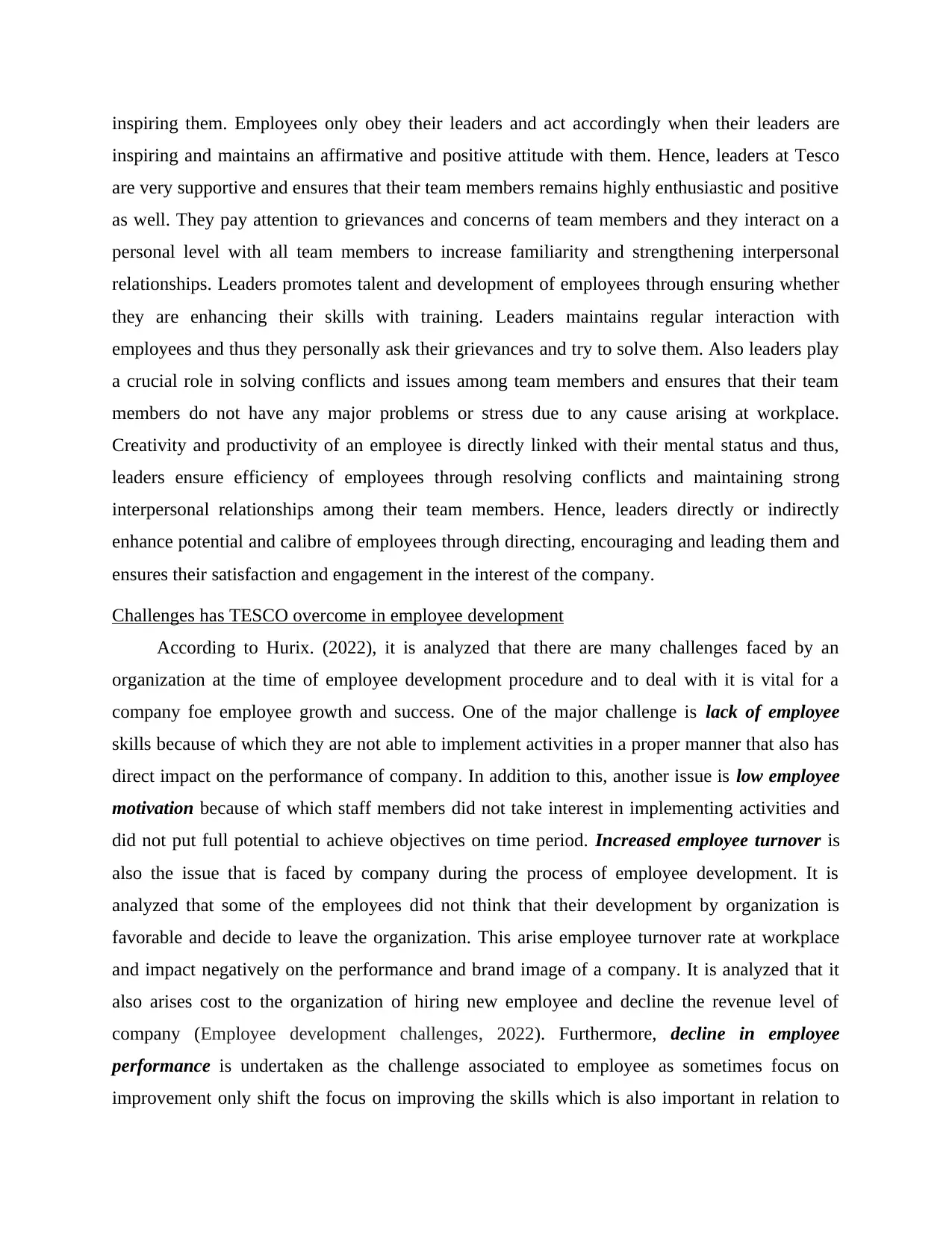
inspiring them. Employees only obey their leaders and act accordingly when their leaders are
inspiring and maintains an affirmative and positive attitude with them. Hence, leaders at Tesco
are very supportive and ensures that their team members remains highly enthusiastic and positive
as well. They pay attention to grievances and concerns of team members and they interact on a
personal level with all team members to increase familiarity and strengthening interpersonal
relationships. Leaders promotes talent and development of employees through ensuring whether
they are enhancing their skills with training. Leaders maintains regular interaction with
employees and thus they personally ask their grievances and try to solve them. Also leaders play
a crucial role in solving conflicts and issues among team members and ensures that their team
members do not have any major problems or stress due to any cause arising at workplace.
Creativity and productivity of an employee is directly linked with their mental status and thus,
leaders ensure efficiency of employees through resolving conflicts and maintaining strong
interpersonal relationships among their team members. Hence, leaders directly or indirectly
enhance potential and calibre of employees through directing, encouraging and leading them and
ensures their satisfaction and engagement in the interest of the company.
Challenges has TESCO overcome in employee development
According to Hurix. (2022), it is analyzed that there are many challenges faced by an
organization at the time of employee development procedure and to deal with it is vital for a
company foe employee growth and success. One of the major challenge is lack of employee
skills because of which they are not able to implement activities in a proper manner that also has
direct impact on the performance of company. In addition to this, another issue is low employee
motivation because of which staff members did not take interest in implementing activities and
did not put full potential to achieve objectives on time period. Increased employee turnover is
also the issue that is faced by company during the process of employee development. It is
analyzed that some of the employees did not think that their development by organization is
favorable and decide to leave the organization. This arise employee turnover rate at workplace
and impact negatively on the performance and brand image of a company. It is analyzed that it
also arises cost to the organization of hiring new employee and decline the revenue level of
company (Employee development challenges, 2022). Furthermore, decline in employee
performance is undertaken as the challenge associated to employee as sometimes focus on
improvement only shift the focus on improving the skills which is also important in relation to
inspiring and maintains an affirmative and positive attitude with them. Hence, leaders at Tesco
are very supportive and ensures that their team members remains highly enthusiastic and positive
as well. They pay attention to grievances and concerns of team members and they interact on a
personal level with all team members to increase familiarity and strengthening interpersonal
relationships. Leaders promotes talent and development of employees through ensuring whether
they are enhancing their skills with training. Leaders maintains regular interaction with
employees and thus they personally ask their grievances and try to solve them. Also leaders play
a crucial role in solving conflicts and issues among team members and ensures that their team
members do not have any major problems or stress due to any cause arising at workplace.
Creativity and productivity of an employee is directly linked with their mental status and thus,
leaders ensure efficiency of employees through resolving conflicts and maintaining strong
interpersonal relationships among their team members. Hence, leaders directly or indirectly
enhance potential and calibre of employees through directing, encouraging and leading them and
ensures their satisfaction and engagement in the interest of the company.
Challenges has TESCO overcome in employee development
According to Hurix. (2022), it is analyzed that there are many challenges faced by an
organization at the time of employee development procedure and to deal with it is vital for a
company foe employee growth and success. One of the major challenge is lack of employee
skills because of which they are not able to implement activities in a proper manner that also has
direct impact on the performance of company. In addition to this, another issue is low employee
motivation because of which staff members did not take interest in implementing activities and
did not put full potential to achieve objectives on time period. Increased employee turnover is
also the issue that is faced by company during the process of employee development. It is
analyzed that some of the employees did not think that their development by organization is
favorable and decide to leave the organization. This arise employee turnover rate at workplace
and impact negatively on the performance and brand image of a company. It is analyzed that it
also arises cost to the organization of hiring new employee and decline the revenue level of
company (Employee development challenges, 2022). Furthermore, decline in employee
performance is undertaken as the challenge associated to employee as sometimes focus on
improvement only shift the focus on improving the skills which is also important in relation to
⊘ This is a preview!⊘
Do you want full access?
Subscribe today to unlock all pages.

Trusted by 1+ million students worldwide
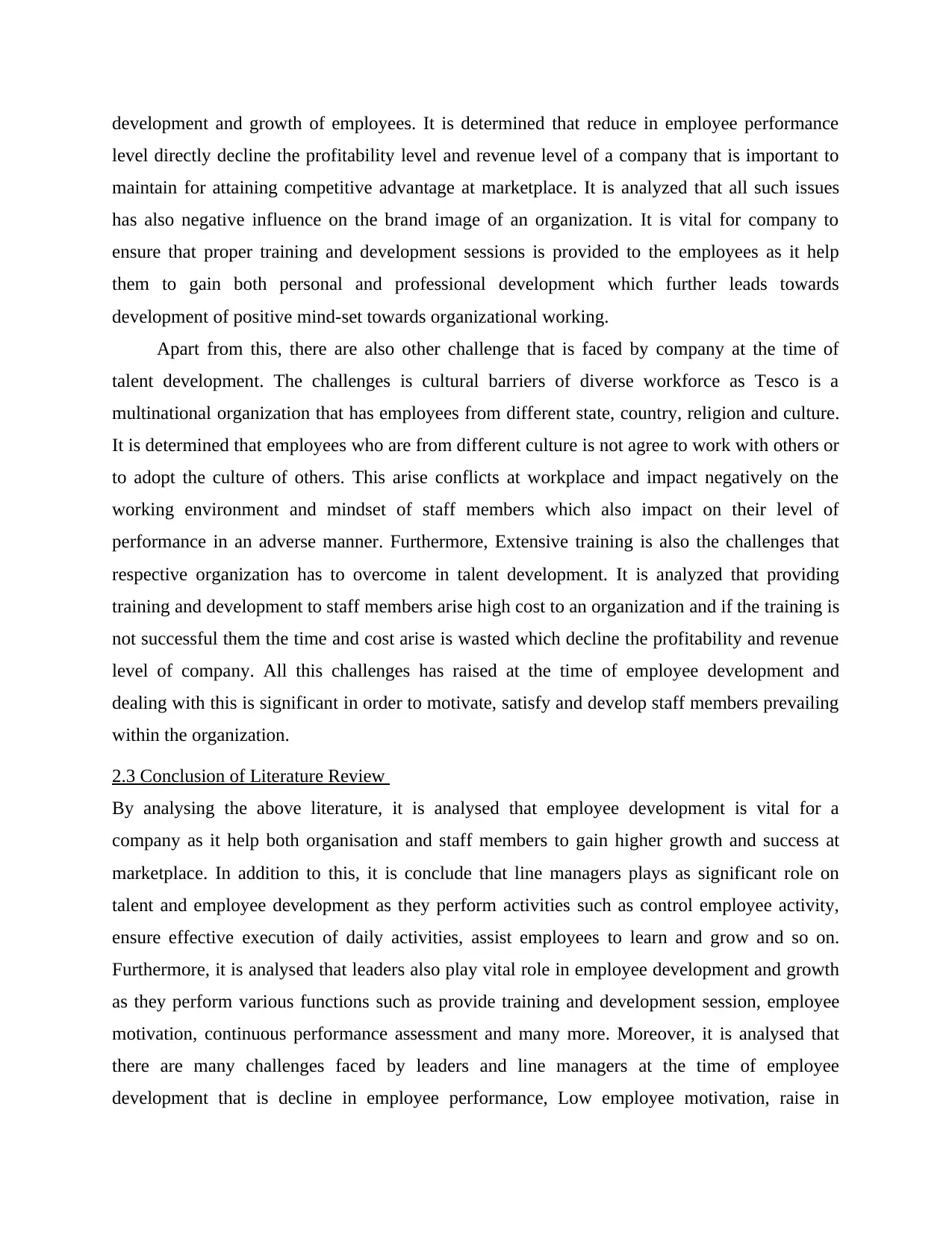
development and growth of employees. It is determined that reduce in employee performance
level directly decline the profitability level and revenue level of a company that is important to
maintain for attaining competitive advantage at marketplace. It is analyzed that all such issues
has also negative influence on the brand image of an organization. It is vital for company to
ensure that proper training and development sessions is provided to the employees as it help
them to gain both personal and professional development which further leads towards
development of positive mind-set towards organizational working.
Apart from this, there are also other challenge that is faced by company at the time of
talent development. The challenges is cultural barriers of diverse workforce as Tesco is a
multinational organization that has employees from different state, country, religion and culture.
It is determined that employees who are from different culture is not agree to work with others or
to adopt the culture of others. This arise conflicts at workplace and impact negatively on the
working environment and mindset of staff members which also impact on their level of
performance in an adverse manner. Furthermore, Extensive training is also the challenges that
respective organization has to overcome in talent development. It is analyzed that providing
training and development to staff members arise high cost to an organization and if the training is
not successful them the time and cost arise is wasted which decline the profitability and revenue
level of company. All this challenges has raised at the time of employee development and
dealing with this is significant in order to motivate, satisfy and develop staff members prevailing
within the organization.
2.3 Conclusion of Literature Review
By analysing the above literature, it is analysed that employee development is vital for a
company as it help both organisation and staff members to gain higher growth and success at
marketplace. In addition to this, it is conclude that line managers plays as significant role on
talent and employee development as they perform activities such as control employee activity,
ensure effective execution of daily activities, assist employees to learn and grow and so on.
Furthermore, it is analysed that leaders also play vital role in employee development and growth
as they perform various functions such as provide training and development session, employee
motivation, continuous performance assessment and many more. Moreover, it is analysed that
there are many challenges faced by leaders and line managers at the time of employee
development that is decline in employee performance, Low employee motivation, raise in
level directly decline the profitability level and revenue level of a company that is important to
maintain for attaining competitive advantage at marketplace. It is analyzed that all such issues
has also negative influence on the brand image of an organization. It is vital for company to
ensure that proper training and development sessions is provided to the employees as it help
them to gain both personal and professional development which further leads towards
development of positive mind-set towards organizational working.
Apart from this, there are also other challenge that is faced by company at the time of
talent development. The challenges is cultural barriers of diverse workforce as Tesco is a
multinational organization that has employees from different state, country, religion and culture.
It is determined that employees who are from different culture is not agree to work with others or
to adopt the culture of others. This arise conflicts at workplace and impact negatively on the
working environment and mindset of staff members which also impact on their level of
performance in an adverse manner. Furthermore, Extensive training is also the challenges that
respective organization has to overcome in talent development. It is analyzed that providing
training and development to staff members arise high cost to an organization and if the training is
not successful them the time and cost arise is wasted which decline the profitability and revenue
level of company. All this challenges has raised at the time of employee development and
dealing with this is significant in order to motivate, satisfy and develop staff members prevailing
within the organization.
2.3 Conclusion of Literature Review
By analysing the above literature, it is analysed that employee development is vital for a
company as it help both organisation and staff members to gain higher growth and success at
marketplace. In addition to this, it is conclude that line managers plays as significant role on
talent and employee development as they perform activities such as control employee activity,
ensure effective execution of daily activities, assist employees to learn and grow and so on.
Furthermore, it is analysed that leaders also play vital role in employee development and growth
as they perform various functions such as provide training and development session, employee
motivation, continuous performance assessment and many more. Moreover, it is analysed that
there are many challenges faced by leaders and line managers at the time of employee
development that is decline in employee performance, Low employee motivation, raise in
Paraphrase This Document
Need a fresh take? Get an instant paraphrase of this document with our AI Paraphraser
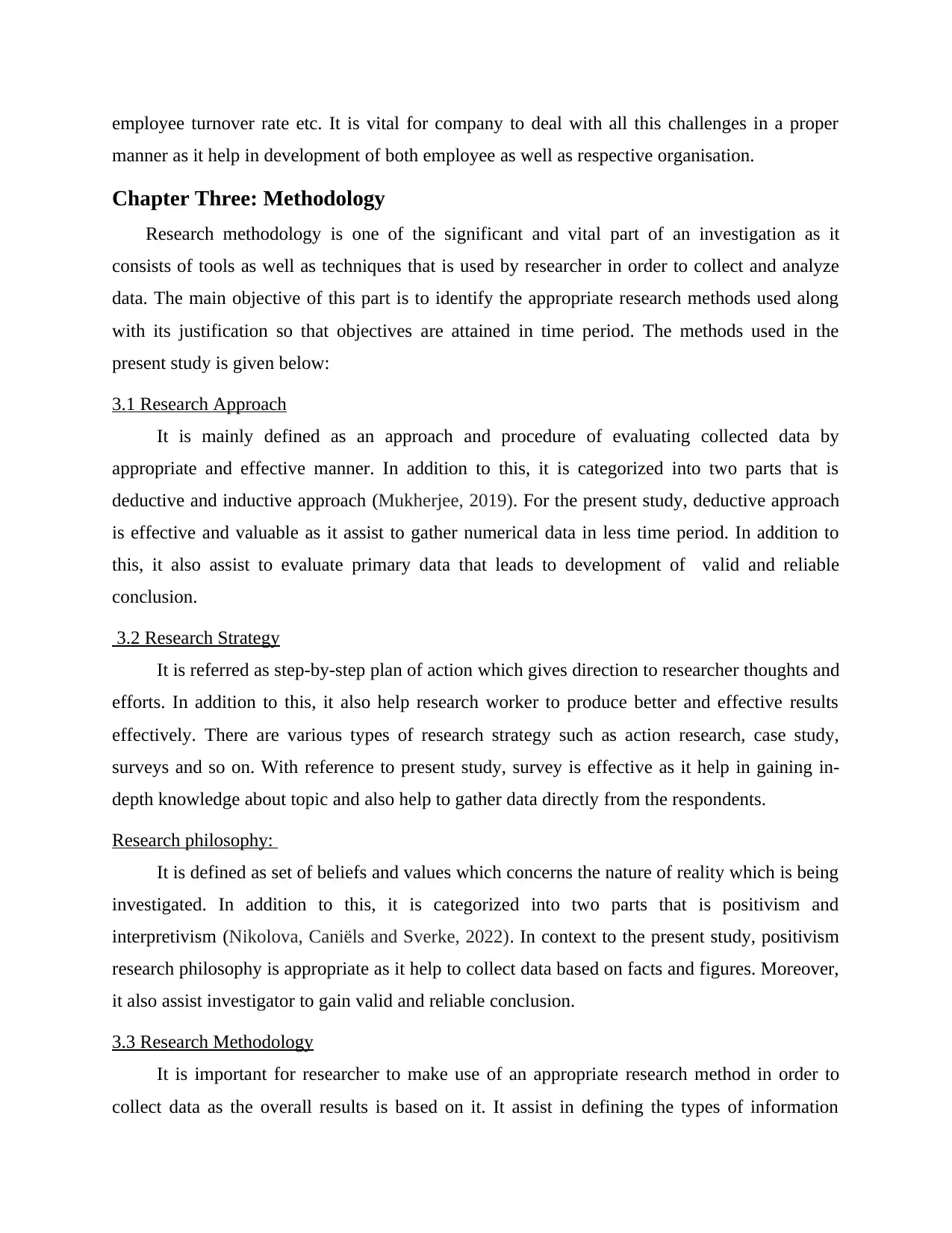
employee turnover rate etc. It is vital for company to deal with all this challenges in a proper
manner as it help in development of both employee as well as respective organisation.
Chapter Three: Methodology
Research methodology is one of the significant and vital part of an investigation as it
consists of tools as well as techniques that is used by researcher in order to collect and analyze
data. The main objective of this part is to identify the appropriate research methods used along
with its justification so that objectives are attained in time period. The methods used in the
present study is given below:
3.1 Research Approach
It is mainly defined as an approach and procedure of evaluating collected data by
appropriate and effective manner. In addition to this, it is categorized into two parts that is
deductive and inductive approach (Mukherjee, 2019). For the present study, deductive approach
is effective and valuable as it assist to gather numerical data in less time period. In addition to
this, it also assist to evaluate primary data that leads to development of valid and reliable
conclusion.
3.2 Research Strategy
It is referred as step-by-step plan of action which gives direction to researcher thoughts and
efforts. In addition to this, it also help research worker to produce better and effective results
effectively. There are various types of research strategy such as action research, case study,
surveys and so on. With reference to present study, survey is effective as it help in gaining in-
depth knowledge about topic and also help to gather data directly from the respondents.
Research philosophy:
It is defined as set of beliefs and values which concerns the nature of reality which is being
investigated. In addition to this, it is categorized into two parts that is positivism and
interpretivism (Nikolova, Caniëls and Sverke, 2022). In context to the present study, positivism
research philosophy is appropriate as it help to collect data based on facts and figures. Moreover,
it also assist investigator to gain valid and reliable conclusion.
3.3 Research Methodology
It is important for researcher to make use of an appropriate research method in order to
collect data as the overall results is based on it. It assist in defining the types of information
manner as it help in development of both employee as well as respective organisation.
Chapter Three: Methodology
Research methodology is one of the significant and vital part of an investigation as it
consists of tools as well as techniques that is used by researcher in order to collect and analyze
data. The main objective of this part is to identify the appropriate research methods used along
with its justification so that objectives are attained in time period. The methods used in the
present study is given below:
3.1 Research Approach
It is mainly defined as an approach and procedure of evaluating collected data by
appropriate and effective manner. In addition to this, it is categorized into two parts that is
deductive and inductive approach (Mukherjee, 2019). For the present study, deductive approach
is effective and valuable as it assist to gather numerical data in less time period. In addition to
this, it also assist to evaluate primary data that leads to development of valid and reliable
conclusion.
3.2 Research Strategy
It is referred as step-by-step plan of action which gives direction to researcher thoughts and
efforts. In addition to this, it also help research worker to produce better and effective results
effectively. There are various types of research strategy such as action research, case study,
surveys and so on. With reference to present study, survey is effective as it help in gaining in-
depth knowledge about topic and also help to gather data directly from the respondents.
Research philosophy:
It is defined as set of beliefs and values which concerns the nature of reality which is being
investigated. In addition to this, it is categorized into two parts that is positivism and
interpretivism (Nikolova, Caniëls and Sverke, 2022). In context to the present study, positivism
research philosophy is appropriate as it help to collect data based on facts and figures. Moreover,
it also assist investigator to gain valid and reliable conclusion.
3.3 Research Methodology
It is important for researcher to make use of an appropriate research method in order to
collect data as the overall results is based on it. It assist in defining the types of information
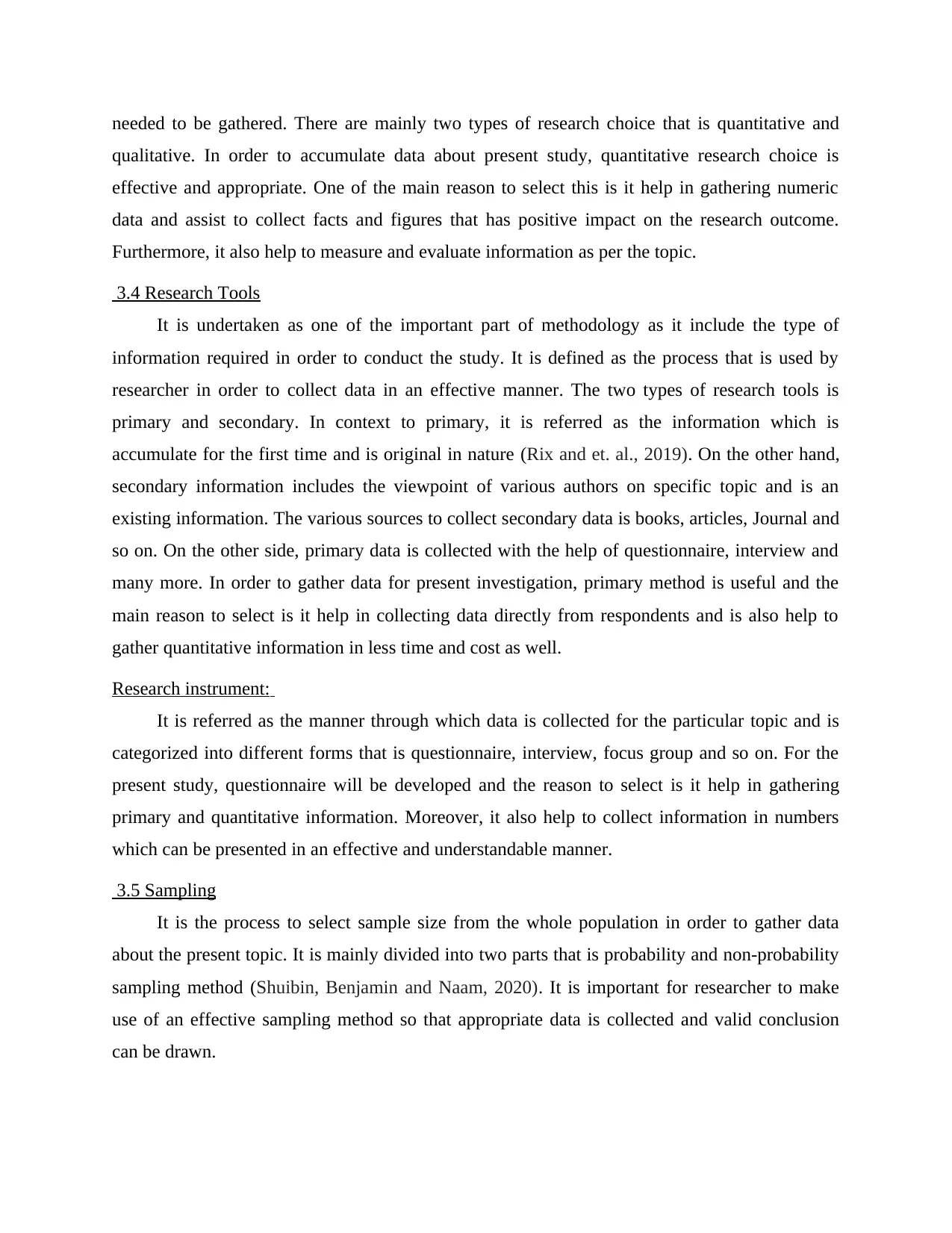
needed to be gathered. There are mainly two types of research choice that is quantitative and
qualitative. In order to accumulate data about present study, quantitative research choice is
effective and appropriate. One of the main reason to select this is it help in gathering numeric
data and assist to collect facts and figures that has positive impact on the research outcome.
Furthermore, it also help to measure and evaluate information as per the topic.
3.4 Research Tools
It is undertaken as one of the important part of methodology as it include the type of
information required in order to conduct the study. It is defined as the process that is used by
researcher in order to collect data in an effective manner. The two types of research tools is
primary and secondary. In context to primary, it is referred as the information which is
accumulate for the first time and is original in nature (Rix and et. al., 2019). On the other hand,
secondary information includes the viewpoint of various authors on specific topic and is an
existing information. The various sources to collect secondary data is books, articles, Journal and
so on. On the other side, primary data is collected with the help of questionnaire, interview and
many more. In order to gather data for present investigation, primary method is useful and the
main reason to select is it help in collecting data directly from respondents and is also help to
gather quantitative information in less time and cost as well.
Research instrument:
It is referred as the manner through which data is collected for the particular topic and is
categorized into different forms that is questionnaire, interview, focus group and so on. For the
present study, questionnaire will be developed and the reason to select is it help in gathering
primary and quantitative information. Moreover, it also help to collect information in numbers
which can be presented in an effective and understandable manner.
3.5 Sampling
It is the process to select sample size from the whole population in order to gather data
about the present topic. It is mainly divided into two parts that is probability and non-probability
sampling method (Shuibin, Benjamin and Naam, 2020). It is important for researcher to make
use of an effective sampling method so that appropriate data is collected and valid conclusion
can be drawn.
qualitative. In order to accumulate data about present study, quantitative research choice is
effective and appropriate. One of the main reason to select this is it help in gathering numeric
data and assist to collect facts and figures that has positive impact on the research outcome.
Furthermore, it also help to measure and evaluate information as per the topic.
3.4 Research Tools
It is undertaken as one of the important part of methodology as it include the type of
information required in order to conduct the study. It is defined as the process that is used by
researcher in order to collect data in an effective manner. The two types of research tools is
primary and secondary. In context to primary, it is referred as the information which is
accumulate for the first time and is original in nature (Rix and et. al., 2019). On the other hand,
secondary information includes the viewpoint of various authors on specific topic and is an
existing information. The various sources to collect secondary data is books, articles, Journal and
so on. On the other side, primary data is collected with the help of questionnaire, interview and
many more. In order to gather data for present investigation, primary method is useful and the
main reason to select is it help in collecting data directly from respondents and is also help to
gather quantitative information in less time and cost as well.
Research instrument:
It is referred as the manner through which data is collected for the particular topic and is
categorized into different forms that is questionnaire, interview, focus group and so on. For the
present study, questionnaire will be developed and the reason to select is it help in gathering
primary and quantitative information. Moreover, it also help to collect information in numbers
which can be presented in an effective and understandable manner.
3.5 Sampling
It is the process to select sample size from the whole population in order to gather data
about the present topic. It is mainly divided into two parts that is probability and non-probability
sampling method (Shuibin, Benjamin and Naam, 2020). It is important for researcher to make
use of an effective sampling method so that appropriate data is collected and valid conclusion
can be drawn.
⊘ This is a preview!⊘
Do you want full access?
Subscribe today to unlock all pages.

Trusted by 1+ million students worldwide
1 out of 30
Related Documents
Your All-in-One AI-Powered Toolkit for Academic Success.
+13062052269
info@desklib.com
Available 24*7 on WhatsApp / Email
![[object Object]](/_next/static/media/star-bottom.7253800d.svg)
Unlock your academic potential
Copyright © 2020–2026 A2Z Services. All Rights Reserved. Developed and managed by ZUCOL.




